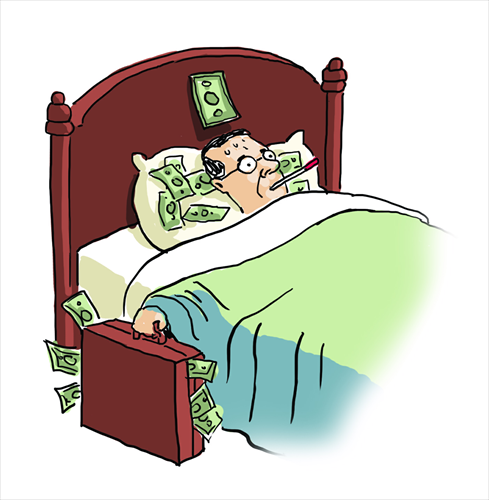HOME >> OP-ED
Affluenza strikes on both sides of Pacific
By Rong Xiaoqing Source:Global Times Published: 2013-12-26 21:58:01

Illustration: Liu Rui/GT
In this hyper-globalized world, no virus can stay local anymore. No matter whether it is carried by birds or by people, they all threaten to develop into global epidemics. It is true with influenza as well as affluenza.The former is highlighted every now and then in bold headlines by scary string codes such as N7H9 or H7N9. The latter, in case you haven't heard it, is a term born in the US with the 1996 book The Golden Ghetto: The Psychology of Affluence by psychotherapist Jessie O'Neill, and the 1997 PBS documentary Affluenza. It's used to describe the self-indulgence of the rich.
It is still spreading now in the US. But it is certainly no longer an exclusive American disease. Wild parties, fueled with drugs, sex, and of course lots of money, can also be seen in China these days.
Barron Hilton, part of the increasingly infamous hotel family, asked "Do you know who my sisters are?" during a recent argument that led to a brawl at a recent party in Miami. This familiar cry was matched in China by the catchphrase "My father is Li Gang," shouted at the police by the son of a local deputy police chief after he killed one college student and injured another by driving a speeding car.
And Wall Street fat cats' assumption that they are immune from liability for messing around with the financial system and destroying other people's lives to satisfy their own greed is matched by similar symptoms shown by some State-owned company chiefs in China.
But there is a major difference when it comes to punishment for those suffering from affluenza.
In China, these days such patients often get a heavier dose of punishment if they're ever formally brought before the law and the public becomes aware of their offences.
In September, the 17-year-old son of famous military singers Li Shuangjiang and Meng Ge was sentenced to 10 years in jail for his leading role in gang raping an 18-year-old girl.
Some legal experts think this is an unusually heavy sentence for a minor. But this is also a case that caught broad attention in the anti-elite atmosphere currently dominating China. By the time the court needed to rule, an angry public had already made the decision for it.
But 16-year-old Ethan Couch faced a total different situation. Driving drunk, he mowed down four people and injured two others. He was suffering from "affluenza," his defense team claimed. And the argument? He is spoiled by his parents. It's not his fault. The judge bought it and gave him an extremely light sentence, a 10-year probation plus a year of inpatient time in rehab that cost $450,000 per year, paid for by his rich parents.
The sentence triggered a lot of outrage in the US. But this is not the first time a court caught attention this way.
The court system in the US does try to keep things fair. From the selection of jurors to the appointments of judges, the procedures have been designed to avoid bias and prejudice.
In September, a municipal judge in New Jersey had to resign when the court decided his expression of his opinions as a part-time stand-up comedian conflicted with the objectivity requirement of a judge. One apparent side effect of all this is the over-emphasis on procedures and sometimes the absence of common sense in the justice system.
In China, the challenge comes from the opposite direction. Human factors still play too much of a role in the legal system. From the social status of the parties involved to public opinion and netizens' mumblings, they can all play a role in court decisions. And this can sometimes be a question of life or death. This may have served justice in its own way. But consistency, which is an important part in a reliable legal system, is under threat.
Finding the balance is daunting. But that balance is the key to get the most effective prescription for many diseases, including affluenza.
The author is a New York-based journalist. rong_xiaoqing@hotmail.com
Posted in: Viewpoint, Rong Xiaoqing